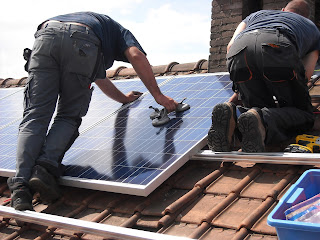As temperatures soar to unprecedented levels across the globe, the adverse effects of extreme heat are becoming increasingly apparent. Apart from the health and environmental implications, one often overlooked consequence is the significant impact it can have on your electricity bill. In this blog, we'll explore the various ways in which extreme heat can lead to an increase in your electricity expenses, and offer practical tips to mitigate these effects.
Increased Cooling Demands
During heatwaves, the demand for cooling systems such as air conditioners and fans skyrockets. These appliances work tirelessly to keep indoor temperatures bearable. Unfortunately, they also contribute substantially to your energy consumption. Running an air conditioner for extended periods can lead to higher electricity bills, particularly if the system is inefficient or improperly maintained.
Reduced Efficiency of Appliances
Prolonged exposure to extreme heat can negatively impact the performance of electronic devices and household appliances. When your appliances operate in an environment with elevated temperatures, they require more energy to function optimally, leading to increased electricity usage. Refrigerators, for instance, struggle to maintain cooler temperatures when the ambient heat is high, causing them to consume more energy.
Peak Demand Pricing
Utilities often implement peak demand pricing during periods of extreme heat. As the demand for electricity spikes, energy providers raise their rates to manage the strain on the power grid. Consequently, your electricity bill may surge during these peak periods, further exacerbating the financial impact of extreme heat.
Water Heating Costs
Extreme heat also affects your water heating expenses. During hotter months, cold water temperature decreases, causing your water heater to work harder to reach the desired temperature for showers and other household tasks. This increased energy consumption results in higher electricity bills.
Impact on Solar Power
For those with solar panels, extreme heat can present both advantages and challenges. While solar panels thrive in sunlight, they can experience efficiency reductions in extreme temperatures. Additionally, the excess heat can reduce battery performance, leading to higher reliance on grid electricity during heatwaves.
Mitigation Strategies
While we can't control the weather, we can take steps to minimize the impact of extreme heat on our electricity bills:
1. Optimize Cooling Systems: Regularly service and maintain your air conditioners and fans to ensure they operate at peak efficiency. Consider using programmable thermostats and setting them at energy-saving temperatures during the day.
2. Unplug Appliances: When not in use, unplug electronic devices and appliances to prevent energy consumption in standby mode.
3. Energy-Efficient Appliances: Invest in energy-efficient appliances with higher SEER ratings for air conditioners and ENERGY STAR certification for other appliances.
4. Time Your Energy Use: Use major appliances, like dishwashers and washing machines, during off-peak hours to take advantage of lower electricity rates.
5. Solar Panel Maintenance: Keep your solar panels clean and free of debris to maximize their efficiency, and monitor battery performance during extreme heat.
Extreme heat is a formidable force that can significantly impact your electricity bill. By understanding the various factors contributing to increased energy consumption during hot spells, we can take proactive measures to mitigate their effects. From optimizing cooling systems to practicing energy-conscious habits, each small effort counts towards a more sustainable and cost-effective future. Let's embrace these strategies and beat the heat without breaking the bank.







No comments:
Post a Comment